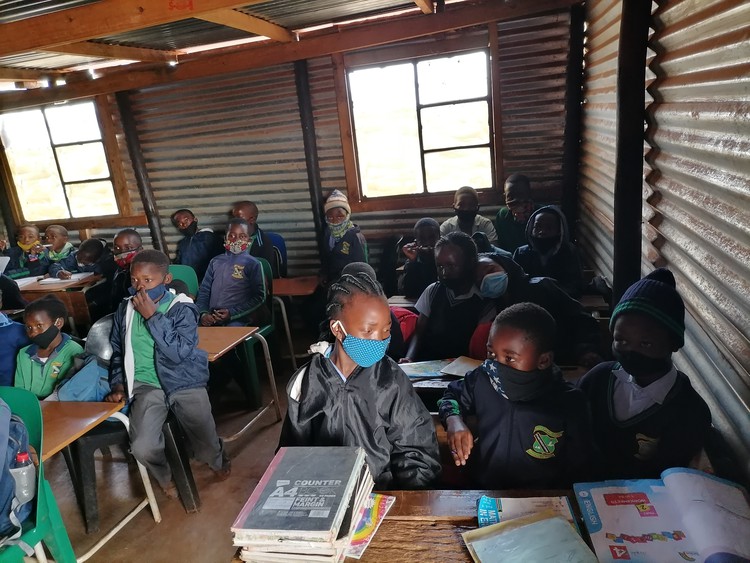Parents demand more classrooms so learners can return to school full time
The rural school in Limpopo only has two brick classrooms, five mobile classrooms and a zinc sheet classroom for 353 learners
At least three learners have to share a small desk in a zinc classroom erected by parents at Maila Primary under the Makhado Local Municipality, Limpopo. Photo: Bernard Chiguvare
Parents and school governing body members at Maila Primary under the Makhado Local Municipality want the education department to build them classrooms so all learners can attend classes full time again.
The school appears to be adhering to the Covid-19 safety measures by offering hand sanitiser to learners and visitors at the entrance. Each classroom also has a bucket of water with soap for learners to wash their hands.
Maila has 353 learners from grades R to 7 who are accommodated in two brick classrooms, five mobile classrooms and a zinc sheet classroom. This, however, does not allow for the recommended one metre spacing between learners in each classroom.
“We have been pleading with the Limpopo Department of Education to build more classrooms even before the outbreak of Covid-19. There is no way our learners can practise social distancing,” said Hellen Makhumisani, SGB chairperson. She said they also alerted the department’s district offices of their predicament on 2 August 2021.
Pointing to the zinc structure with two small windows, Makhumisani said that the classroom was erected by parents to create another indoor structure where learning could take place. The grade 4 class is overcrowded with at least three learners sharing small desks.
Given Magira from Munzhedzi village has two children who attend Maila. “The department should build more classrooms to avert the situation so that all learners can attend school every day,” he said.
Tidimalo Cheune, provincial education department spokesperson said they are aware of the challenges. According to a circular issued on 1 August, all primary school learners are to attend school full time.
The circular also states that if a school is unable to return learners to the traditional and daily attendance, they need to apply for approval.
“Since March last year our learners have lost a lot of learning time. This is a rural environment. Most learners are from vulnerable families that cannot afford to buy smartphones, data, listening to the radio or watching TV lessons offered by different local media stations.
“We cannot allow our children to rotate. They will still be losing learning time. All we need is more classrooms to accommodate our learners while they observe social distancing,” said Makhumisani.
Support independent journalism
Donate using Payfast

Next: PRASA sues whistleblower for R45 million
Previous: Study finds extreme levels of violence against sex workers
© 2021 GroundUp. This article is licensed under a Creative Commons Attribution-NoDerivatives 4.0 International License.
You may republish this article, so long as you credit the authors and GroundUp, and do not change the text. Please include a link back to the original article.
We put an invisible pixel in the article so that we can count traffic to republishers. All analytics tools are solely on our servers. We do not give our logs to any third party. Logs are deleted after two weeks. We do not use any IP address identifying information except to count regional traffic. We are solely interested in counting hits, not tracking users. If you republish, please do not delete the invisible pixel.

